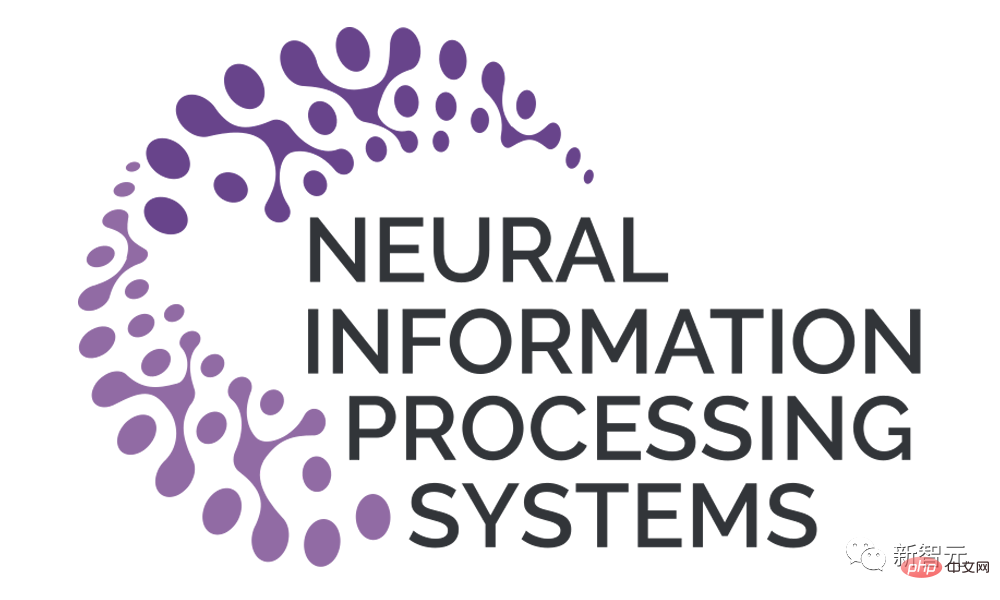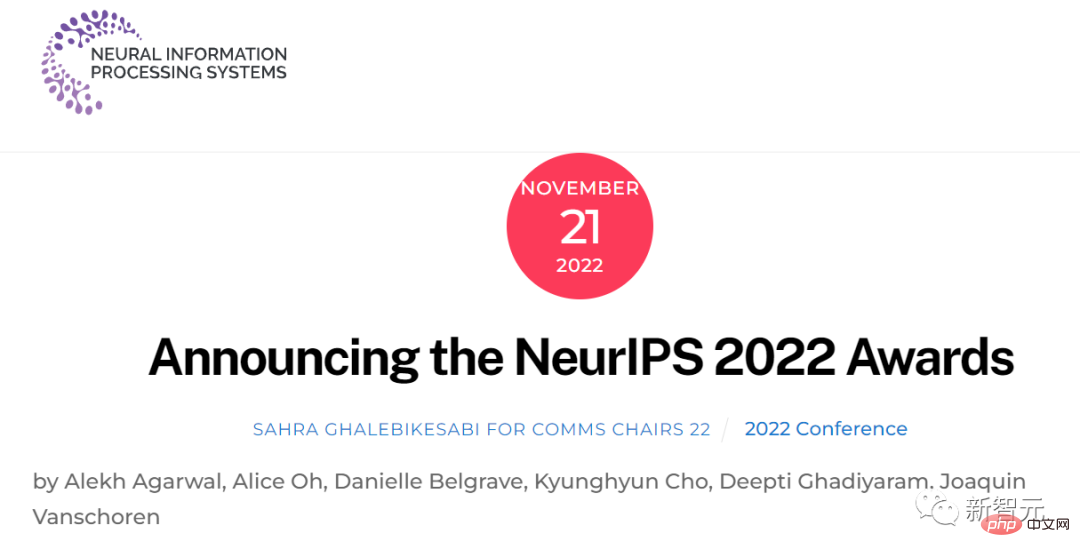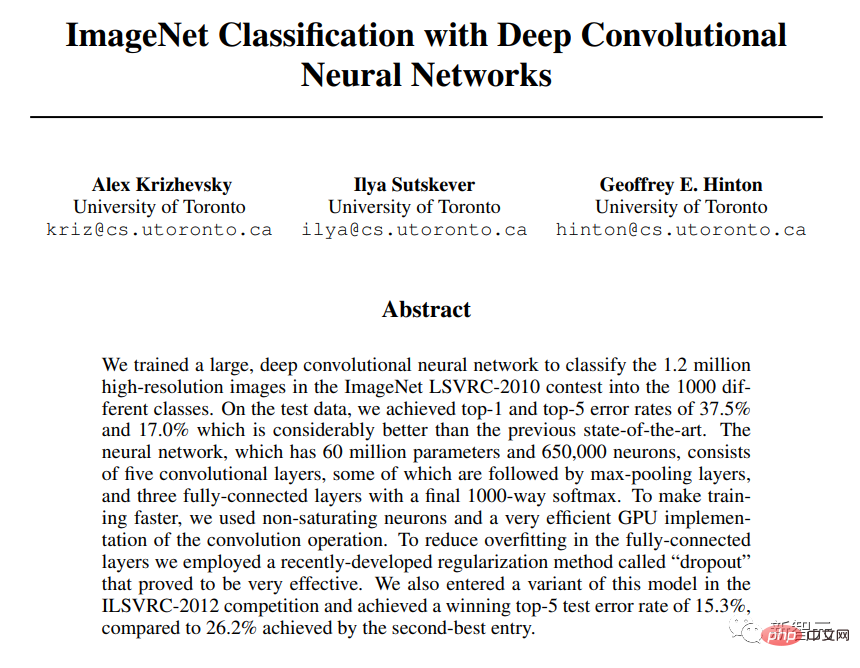 Technology peripherals
Technology peripherals
 AI
AI
 NeurIPS 2022 outstanding papers are announced! Stanford University successfully 'defended' the title, and Li Feifei was named on the list of top apprentices
NeurIPS 2022 outstanding papers are announced! Stanford University successfully 'defended' the title, and Li Feifei was named on the list of top apprentices
NeurIPS 2022 outstanding papers are announced! Stanford University successfully 'defended' the title, and Li Feifei was named on the list of top apprentices
The annual international artificial intelligence summitNeurIPS, the full name of Neural Information Processing Systems (Neural Information Processing Systems), is usually held in December every year.

This year is the 36th NeurIPS, which will last for two weeks starting from November 28: The first week will be held in New Orleans, USA. , and the second week was converted to an online meeting.
As the "appetizer" for the official meeting, as usual, the NeurIPS organizing committee will officially announce the list of winning papers. The three awards are Outstanding Papers Award(Outstanding Papers ), Outstanding Datasets and Benchmarks Papers Award(Outstanding Datasets and Benchmarks Papers) and Time Test Award(Test of Time Award).
As one of the most prestigious artificial intelligence events in the world, NeurIPS received a total of 10,411 papers this year, of which 2,672 were accepted after review, with an acceptance rate of only 25.6%.
And the paper that finally won the award is one of the best, and can fully represent the highest level of current neuroscience and artificial intelligence research.

On the award list, a total of 13 papers won the Outstanding Paper Award this year, the number was last year (6 papers) Twice; Outstanding Dataset and Benchmark Paper Award and Time Test Award were awarded to 2 and 1 papers respectively, and the number was the same as last year.
According to the NeurIPS review, the committee selected these papers because they"have outstanding creativity, insight, clarity, and potential to change the world".
Among the 13 papers that won the Outstanding Paper Award, 3 papers were provided by Chinese teams, and 2 results were completed by the "All-Chinese Class" .
It is worth mentioning that "MineDojo: Building Open-Ended Embodied Agents with Internet-Scale Knowledge" won the Outstanding Dataset and Benchmark Paper Award, by It was completed by Linxi Fan (first author) and Yuke Zhu (co-advisor), two disciples of Li Feifei, a Chinese-American academician and professor at Stanford University.
This article proposes a novel agent learning algorithm that can solve problems specified in a free-form language by introducing a new framework MineDojo built on the game "Minecraft". various open-ended tasks.
Among the 16 award-winning papers this year, 4 have the participation of researchers from Stanford University, and in the 2021 selection, they also have 3 selected. In the field of artificial intelligence research, the leading advantage of this top American school is evident.
Finally, the most interesting award selected every year is the Time Test Award, which specializes in selecting papers from ancient times.
Last year this award was won by researchers from Princeton University, this year it was awarded to Alex Krizhevsky, Ilya Sutskever and Geoffrey E. Hinton of the University of Toronto for their work published in 2012 "ImageNet Classification with Deep Convolutional Neural Networks".

Among the reasons for the award, the NeurIPS judges wrote, “As the first CNN to be trained on the ImageNet challenge, this 2012 study Far exceeding the state-of-the-art technology at the time, it opened a new wave of deep learning and had a profound impact on the machine learning community."
Outstanding Paper Award
1. Is Out-of-Distribution Detection Learnable?
##(Zhen Fang, Yixuan Li, Jie Lu, Jiahua Dong, Bo Han, Feng Liu)
2、Photorealistic Text-to-Image Diffusion Models with Deep Language Understanding
(Chitwan Saharia、William Chan、Saurabh Saxena等)
3、Elucidating the Design Space of Diffusion-Based Generative Models
(Tero Karras、Miika Aittala、Timo Aila、Samuli Laine)
4、ProcTHOR: Large-Scale Embodied AI Using Procedural Generation
(Matt Deitke、Eli VanderBilt、Alvaro Herrasti等)
5、Using natural language and program abstractions to instill human inductive biases in machines
(Sreejan Kumar、Carlos G. Correa、Ishita Dasgupta等)
6、A Neural Corpus Indexer for Document Retrieval
(Yujing Wang、Yingyan Hou、Haonan Wang等)
7、High-dimensional limit theorems for SGD: Effective dynamics and critical scaling
(Gerard Ben Arous、Reza Gheissari、Aukosh Jagannath)
8、Gradient Descent: The Ultimate Optimizer
(Kartik Chandra、Audrey Xie、Jonathan Ragan-Kelley等)
9、Riemannian Score-Based Generative Modelling
(Valentin De Bortoli、 Emile Mathieu、Michael John Hutchinson等)
10、Gradient Estimation with Discrete Stein Operators
(Jiaxin Shi、Yuhao Zhou、Jessica Hwang等)
11、An empirical analysis of compute-optimal large language model training
(Jordan Hoffmann、Sebastian Borgeaud、Arthur Mensch等)
12、Beyond neural scaling laws: beating power law scaling via data pruning
(Ben Sorscher、Robert Geirhos、Shashank Shekhar等)
13、On-Demand Sampling: Learning Optimally from Multiple Distributions
(Nika Haghtalab、Michael Jordan、Eric Zhao)
杰出数据集和基准论文奖
1、LAION-5B: An open large-scale dataset for training next generation image-text models
(Christoph Schuhmann 、 Romain Beaumont 、 Richard Vencu等)
2、MineDojo: Building Open-Ended Embodied Agents with Internet-Scale Knowledge
(Linxi Fan、Guanzhi Wang、Yunfan Jiang等)
时间检验奖
1、ImageNet Classification with Deep Convolutional Neural Networks
(Alex Krizhevsky 、 Ilya Sutskever、Geoffrey E. Hinton)
详细获奖名单可见:
https://blog.neurips.cc/2022/11/21/announcing-the-neurips-2022-awards/
The above is the detailed content of NeurIPS 2022 outstanding papers are announced! Stanford University successfully 'defended' the title, and Li Feifei was named on the list of top apprentices. For more information, please follow other related articles on the PHP Chinese website!

Hot AI Tools

Undresser.AI Undress
AI-powered app for creating realistic nude photos

AI Clothes Remover
Online AI tool for removing clothes from photos.

Undress AI Tool
Undress images for free

Clothoff.io
AI clothes remover

Video Face Swap
Swap faces in any video effortlessly with our completely free AI face swap tool!

Hot Article

Hot Tools

Notepad++7.3.1
Easy-to-use and free code editor

SublimeText3 Chinese version
Chinese version, very easy to use

Zend Studio 13.0.1
Powerful PHP integrated development environment

Dreamweaver CS6
Visual web development tools

SublimeText3 Mac version
God-level code editing software (SublimeText3)

Hot Topics
 1389
1389
 52
52
 Bytedance Cutting launches SVIP super membership: 499 yuan for continuous annual subscription, providing a variety of AI functions
Jun 28, 2024 am 03:51 AM
Bytedance Cutting launches SVIP super membership: 499 yuan for continuous annual subscription, providing a variety of AI functions
Jun 28, 2024 am 03:51 AM
This site reported on June 27 that Jianying is a video editing software developed by FaceMeng Technology, a subsidiary of ByteDance. It relies on the Douyin platform and basically produces short video content for users of the platform. It is compatible with iOS, Android, and Windows. , MacOS and other operating systems. Jianying officially announced the upgrade of its membership system and launched a new SVIP, which includes a variety of AI black technologies, such as intelligent translation, intelligent highlighting, intelligent packaging, digital human synthesis, etc. In terms of price, the monthly fee for clipping SVIP is 79 yuan, the annual fee is 599 yuan (note on this site: equivalent to 49.9 yuan per month), the continuous monthly subscription is 59 yuan per month, and the continuous annual subscription is 499 yuan per year (equivalent to 41.6 yuan per month) . In addition, the cut official also stated that in order to improve the user experience, those who have subscribed to the original VIP
 Context-augmented AI coding assistant using Rag and Sem-Rag
Jun 10, 2024 am 11:08 AM
Context-augmented AI coding assistant using Rag and Sem-Rag
Jun 10, 2024 am 11:08 AM
Improve developer productivity, efficiency, and accuracy by incorporating retrieval-enhanced generation and semantic memory into AI coding assistants. Translated from EnhancingAICodingAssistantswithContextUsingRAGandSEM-RAG, author JanakiramMSV. While basic AI programming assistants are naturally helpful, they often fail to provide the most relevant and correct code suggestions because they rely on a general understanding of the software language and the most common patterns of writing software. The code generated by these coding assistants is suitable for solving the problems they are responsible for solving, but often does not conform to the coding standards, conventions and styles of the individual teams. This often results in suggestions that need to be modified or refined in order for the code to be accepted into the application
 Can fine-tuning really allow LLM to learn new things: introducing new knowledge may make the model produce more hallucinations
Jun 11, 2024 pm 03:57 PM
Can fine-tuning really allow LLM to learn new things: introducing new knowledge may make the model produce more hallucinations
Jun 11, 2024 pm 03:57 PM
Large Language Models (LLMs) are trained on huge text databases, where they acquire large amounts of real-world knowledge. This knowledge is embedded into their parameters and can then be used when needed. The knowledge of these models is "reified" at the end of training. At the end of pre-training, the model actually stops learning. Align or fine-tune the model to learn how to leverage this knowledge and respond more naturally to user questions. But sometimes model knowledge is not enough, and although the model can access external content through RAG, it is considered beneficial to adapt the model to new domains through fine-tuning. This fine-tuning is performed using input from human annotators or other LLM creations, where the model encounters additional real-world knowledge and integrates it
 Seven Cool GenAI & LLM Technical Interview Questions
Jun 07, 2024 am 10:06 AM
Seven Cool GenAI & LLM Technical Interview Questions
Jun 07, 2024 am 10:06 AM
To learn more about AIGC, please visit: 51CTOAI.x Community https://www.51cto.com/aigc/Translator|Jingyan Reviewer|Chonglou is different from the traditional question bank that can be seen everywhere on the Internet. These questions It requires thinking outside the box. Large Language Models (LLMs) are increasingly important in the fields of data science, generative artificial intelligence (GenAI), and artificial intelligence. These complex algorithms enhance human skills and drive efficiency and innovation in many industries, becoming the key for companies to remain competitive. LLM has a wide range of applications. It can be used in fields such as natural language processing, text generation, speech recognition and recommendation systems. By learning from large amounts of data, LLM is able to generate text
 Five schools of machine learning you don't know about
Jun 05, 2024 pm 08:51 PM
Five schools of machine learning you don't know about
Jun 05, 2024 pm 08:51 PM
Machine learning is an important branch of artificial intelligence that gives computers the ability to learn from data and improve their capabilities without being explicitly programmed. Machine learning has a wide range of applications in various fields, from image recognition and natural language processing to recommendation systems and fraud detection, and it is changing the way we live. There are many different methods and theories in the field of machine learning, among which the five most influential methods are called the "Five Schools of Machine Learning". The five major schools are the symbolic school, the connectionist school, the evolutionary school, the Bayesian school and the analogy school. 1. Symbolism, also known as symbolism, emphasizes the use of symbols for logical reasoning and expression of knowledge. This school of thought believes that learning is a process of reverse deduction, through existing
 To provide a new scientific and complex question answering benchmark and evaluation system for large models, UNSW, Argonne, University of Chicago and other institutions jointly launched the SciQAG framework
Jul 25, 2024 am 06:42 AM
To provide a new scientific and complex question answering benchmark and evaluation system for large models, UNSW, Argonne, University of Chicago and other institutions jointly launched the SciQAG framework
Jul 25, 2024 am 06:42 AM
Editor |ScienceAI Question Answering (QA) data set plays a vital role in promoting natural language processing (NLP) research. High-quality QA data sets can not only be used to fine-tune models, but also effectively evaluate the capabilities of large language models (LLM), especially the ability to understand and reason about scientific knowledge. Although there are currently many scientific QA data sets covering medicine, chemistry, biology and other fields, these data sets still have some shortcomings. First, the data form is relatively simple, most of which are multiple-choice questions. They are easy to evaluate, but limit the model's answer selection range and cannot fully test the model's ability to answer scientific questions. In contrast, open-ended Q&A
 SOTA performance, Xiamen multi-modal protein-ligand affinity prediction AI method, combines molecular surface information for the first time
Jul 17, 2024 pm 06:37 PM
SOTA performance, Xiamen multi-modal protein-ligand affinity prediction AI method, combines molecular surface information for the first time
Jul 17, 2024 pm 06:37 PM
Editor | KX In the field of drug research and development, accurately and effectively predicting the binding affinity of proteins and ligands is crucial for drug screening and optimization. However, current studies do not take into account the important role of molecular surface information in protein-ligand interactions. Based on this, researchers from Xiamen University proposed a novel multi-modal feature extraction (MFE) framework, which for the first time combines information on protein surface, 3D structure and sequence, and uses a cross-attention mechanism to compare different modalities. feature alignment. Experimental results demonstrate that this method achieves state-of-the-art performance in predicting protein-ligand binding affinities. Furthermore, ablation studies demonstrate the effectiveness and necessity of protein surface information and multimodal feature alignment within this framework. Related research begins with "S
 SK Hynix will display new AI-related products on August 6: 12-layer HBM3E, 321-high NAND, etc.
Aug 01, 2024 pm 09:40 PM
SK Hynix will display new AI-related products on August 6: 12-layer HBM3E, 321-high NAND, etc.
Aug 01, 2024 pm 09:40 PM
According to news from this site on August 1, SK Hynix released a blog post today (August 1), announcing that it will attend the Global Semiconductor Memory Summit FMS2024 to be held in Santa Clara, California, USA from August 6 to 8, showcasing many new technologies. generation product. Introduction to the Future Memory and Storage Summit (FutureMemoryandStorage), formerly the Flash Memory Summit (FlashMemorySummit) mainly for NAND suppliers, in the context of increasing attention to artificial intelligence technology, this year was renamed the Future Memory and Storage Summit (FutureMemoryandStorage) to invite DRAM and storage vendors and many more players. New product SK hynix launched last year



